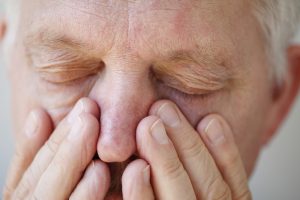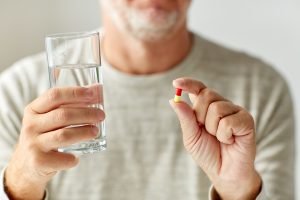Depression is, unfortunately, quite common, and 21 million Americans suffer from major depressive episodes. One of the most popular and effective treatments for depression is taking medications like Zoloft. Whether taking Zoloft (sertraline) for anxiety, depression, or other mental issues, you may be curious if you can still enjoy a glass of wine or a bottle of beer. You may also be wondering what types of alcohol Zoloft reacts to. It’s crucial to understand the potential risks of drinking alcohol while on the medication. This article provides answers to the question, ‘Can You Drink Alcohol on Zoloft’ and everything need to know.
This blog post will explore what you should know about drinking alcohol while taking Zoloft, including the potential risks and side effects.
Can You Drink Alcohol on Zoloft?
Zoloft is a brand name for the generic drug sertraline. This FDA-approved medication is part of a class of drugs named selective serotonin reuptake inhibitors (SSRIs).
SSRIs affect the brain by increasing serotonin levels, a neurotransmitter vital to mood and overall mental health. SSRIs are commonly prescribed for treating mental disorders, including:
- Major depressive disorder
- Obsessive-compulsive disorder (OCD)
- Post-traumatic stress disorder (PTSD)
- Generalized anxiety disorder (GAD)
- Social anxiety disorder (SAD)
- Bipolar disorder
- Panic disorder
- Premenstrual dysphoric disorder (PMDD)
Zoloft also has off-label uses for treating other health conditions, including:
- Bulimia nervosa
- Irritable bowel syndrome (IBS)
- Fibromyalgia or chronic fatigue syndrome
If you’re taking Zoloft or other SSRIs and wondering if it’s safe to mix alcohol and antidepressants, the short answer is usually no. Likewise, it’s generally not recommended to consume alcohol while taking Zoloft or any other antidepressant medication.
While it may be tempting to ease your symptoms with a drink, mixing alcohol with medications like Zoloft can cause serious side effects and even lead to life-threatening situations.
How Does Alcohol Affect Zoloft?
Alcohol impacts the body’s central nervous system (CNS), specifically how the brain functions. When consumed in moderation, alcohol can reduce anxiety and improve your mood. However, drunkenness can cause:
- Confusion
- Drowsiness
- Nausea
- Sedation
- Disorientation
- Blurred vision
- Slurred speech
- Decreased inhibitions
- Poor coordination
- Impaired motor skills
Additionally, too much alcohol over time can disrupt brain functioning, leading to poor decision-making, memory problems, aggression, and depression.
SSRIs like Zoloft also affect the central nervous system by increasing serotonin levels or making serotonin last longer in the brain. Combining Zoloft with alcohol can further interfere with the CNS, causing low mood and lack of motivation.
There are several potential risks when you mix Zoloft with alcohol, including:
Increased drowsiness and fatigue: Combining Zoloft and alcohol can increase sleepiness and exhaustion. This could impair your ability to drive or operate heavy machinery properly.
Decreased effectiveness of the drug: If you drink while taking antidepressants, your medication may not work as well as it should. This could lead to increased depressive symptoms or other mental health issues.
Increased risk of overdose: Alcohol can enhance the effects of Zoloft and other antidepressants, increasing the risk of overdose.
Alcohol poisoning: Drinking too much alcohol can cause serious medical complications such as alcohol poisoning, which can be life-threatening.
Interactions with other medications: Alcohol and antidepressants may interact with other drugs, such as pain medications or sleeping pills, increasing the risk of side effects.
The Dangers of an Alcohol-Zoloft Interaction
Can You Drink Alcohol on Zoloft? Zoloft and alcohol have individual side effects; however, combining the two can cause adverse drug interactions, increasing the risk of severe health complications.
Here are some warning signs of an alcohol and Zoloft interaction:
Respiratory distress: This includes slowed or difficulty breathing, coughing and wheezing.
Intense sedation: If you feel unusually drowsy or are having trouble staying awake, this could indicate an adverse reaction to the combination of Zoloft and alcohol.
Heart palpitation: This can include irregular heartbeats, chest pain, and lightheadedness.
Constant headaches: Headaches that don’t disappear can signify an alcohol and Zoloft interaction.
Changes in behavior or mental status: If you’re feeling unusually agitated or confused or your thoughts seem to be racing out of control, this could indicate an adverse reaction to the combination of antidepressant medications and alcohol.
Suicidal thoughts and behaviors: If you’re feeling hopeless or suicidal, seek help immediately, as this could be a sign of interaction between Zoloft and alcohol.
In some cases, combining Zoloft and alcohol can cause a sertraline overdose. This is a severe medical emergency and requires immediate medical attention. Symptoms of sertraline overdose include:
- Tremors
- Lethargy
- Nausea
- Agitation
- Confusion
- Vomiting
- Dry mouth
- Mydriasis or dilation of the pupils
People don’t experience the same side effects when mixing Zoloft and alcohol. However, it’s best to avoid drinking while taking antidepressants. If you drink while taking Zoloft, drink only in moderation and keep your doctor informed of any changes in your mood or behavior.
Also, tell your doctor immediately if you experience any warning signs of an alcohol-Zoloft interaction. It’s vital to seek medical attention immediately if you suspect you have overdosed on either medication.
It’s crucial to be aware of the risks of drinking alcohol while taking Zoloft. If you risk having a Zoloft and alcohol interaction, talk to your doctor about the best option. It’s critical to be honest with your healthcare provider about how much alcohol you drink so that they can give you the most effective treatment. Your doctor may suggest alternative therapies or lifestyle changes if necessary.
Can Alcohol and Zoloft Cause Serotonin Syndrome?
Serotonin syndrome is a drug-induced condition that occurs when the serotonin levels in your brain are too high. In a study entitled “Demystifying serotonin syndrome (or serotonin toxicity),” doctors found that this condition is usually caused by an overdose of a particular type of antidepressant or a combination of serotonin-elevating drugs, such as SSRIs, serotonin-norepinephrine reuptake inhibitors (SNRIs), or monoamine oxidase inhibitors (MAOIs).
While taking Zoloft alone can cause serotonin syndrome, the combination of Zoloft and alcohol can increase the risk of experiencing this condition. Interestingly, serotonin syndrome symptoms can appear similar to alcohol withdrawal. Therefore, it’s important to tell your doctor how much alcohol you consume and any other medications you are taking if you start experiencing symptoms of serotonin syndrome.
Can You Drink Alcohol on Zoloft: Contraindications
It’s vital to note that Zoloft and alcohol have a contraindication, and their interaction can cause various side effects, putting you at greater risk of experiencing more severe problems. Suppose you choose to drink while on Zoloft; monitoring your reactions and talking to your doctor if anything changes in your mood or behavior is crucial.
If you’re prescribed Zoloft, ask your doctor about the safety of combining it with alcohol. Be honest with your doctor about your drinking habits, and make sure to follow their instructions regarding any lifestyle changes you may need to make to avoid a hazardous interaction. If you have questions or concerns, don’t hesitate to call them.
Zoloft, Alcohol, and Suicide
The interaction between Zoloft and alcohol not only increases the risk of depression, anxiety, and memory loss, but it can also increase the risk of suicide. In addition, the presence of alcohol in your system can interfere with how Zoloft works, increasing the likelihood of suicidal thoughts and behaviors.
Additionally, antidepressant medications usually warn of suicide risk, and alcohol abuse can further increase this risk for users of all ages. That’s why it’s crucial to be aware of any changes in mood or behavior when combining Zoloft and alcohol. If you start to feel hopeless or suicidal, seek immediate medical attention.
If you know someone taking Zoloft who drinks alcohol, it’s critical to be vigilant of any changes in their behavior and look for signs that they could be considering suicide. Likewise, family members, friends, and caretakers must be able to identify the signs of suicide and take appropriate action. While supportive and encouraging, they must watch for signs of suicide attempts linked to Zoloft and alcohol abuse.
Related: Is Zoloft Safe During Pregnancy?
Typical Side Effects of Taking Zoloft With Alcohol
Most doctors and pharmacists advise against taking alcohol while taking Zoloft, as it can interfere with how the medication works in your body. It can also boost the risk of developing side effects such as:
- Nausea
- Vomiting
- Changes in appetite
- Diarrhea
- Agitation
- Anxiety
- Profuse sweating
- Body tremors
- Drowsiness
- Dizziness
- Sexual dysfunction
- Trouble sleeping
In severe cases, the mixture of Zoloft and alcohol can severely impair a person’s judgment and decision-making skills, leading to unsafe behavior like engaging in risky activities. It also increases the risk of thoughts and actions about harming oneself and others.
Effects of Zoloft and Alcohol on the Brain
Excessive alcohol consumption can cause severe long-term damage to the brain and body. It also can lead to alcoholism, so it’s vital to avoid alcohol while taking Zoloft.
When taken alongside Zoloft, alcohol can also heighten the risk of serotonin syndrome, a potentially fatal condition caused by an overload of serotonin in your brain. Not only does this interfere with how your medication works, but it can also lead to confusion, rapid heart rate, fever, and seizures.
In addition to serotonin syndrome, the combination of Zoloft and alcohol can cause changes in how the brain works by decreasing its ability to process information effectively. This could lead to impaired judgment, difficulty concentrating, and even memory loss. It could also lead to a coma and even death in extreme cases.
How Long Does Zoloft Stay in The System?
The time that any medication stays in your system varies from person to person. Each individual absorbs and metabolizes drugs at a unique rate, so the time it takes Zoloft to break down in your system depends on factors like age, weight, metabolic rate, overall health, and more.
Generally speaking, it takes around five to six days for Zoloft to leave your system entirely. However, it may take longer for some people, especially if they take a higher dose of Zoloft, take other medications, are older, or have liver issues.
It’s vital to remember that even if you decide to cut back on drinking, the effects of alcohol could still linger in your system and react with the medication. Therefore, it’s vital to give your body ample time to metabolize the alcohol before retaking Zoloft.
Be sure to check in with your doctor regularly if you’re taking Zoloft and taking alcohol to ensure that the combination of both substances isn’t harming your health. They’ll be able to monitor your progress and ensure you stay safe while taking Zoloft and alcohol.
When Can I Start Drinking if I’m No Longer Taking Zoloft?
It’s crucial not to skip taking a dose of Zoloft just to be able to have a drink. Skipping doses can lead to serious health complications and withdrawal symptoms, including:
- Dizziness
- Irritability
- Nausea
- Vomiting
- Nightmares
- Headaches
- Paresthesias, or the “pins and needles” sensation on the skin
It can take several days for Zoloft to leave your system altogether, so skipping doses may result in the medication lingering in your system and interacting with alcohol.
If you have finished the course of medication and are no longer taking Zoloft, it is still not advisable to take alcohol immediately. Instead, give your body a chance to metabolize the drug and return to its natural state before you start drinking again.
Also, speak with your doctor before drinking alcohol after you’ve stopped taking Zoloft. Even though the medication has left your system, your healthcare provider may still be able to help you find alternative ways to reduce any anxiety or other symptoms being treated.
Treatment for Alcohol and Zoloft Abuse
If someone you know or you are battling alcohol or Zoloft addiction, seeking professional help is essential. Combining the two substances can cause serious health complications if left untreated, so seeking help from a qualified healthcare provider is imperative.
Getting the proper support from a medical professional can make all the difference in managing co-occurring mental health conditions, such as alcohol use disorder and depressive disorders. Alcohol addiction treatment can significantly reduce the risk of relapse and help you regain control of your life.
Treatment options may include medications, detoxification, psychotherapy, counseling, or other forms of therapy. Getting the right help from a qualified healthcare provider who can assess your unique needs and create an individualized treatment plan tailored to you is essential.
When To Get Medical Attention
You should consult a medical practitioner immediately if you experience any severe symptoms while taking Zoloft and taking alcohol, such as:
- Abnormally slow or fast heart rate
- Shallow or labored breathing
- Confusion
- Nightmares
- Hallucinations
- Manic episodes
- Loss of consciousness
- Suicidal thoughts or actions
People with depressive disorders also have an increased risk of alcohol dependence and addiction, so it’s important to talk to your doctor about any potential problems with alcohol and Zoloft use.
If your alcohol consumption worsens and you experience serious psychological or physical side effects, speak to your doctor immediately. They can support you and help you find the best treatment for you.
Additionally, if your daily life, relationships, work, or school are negatively impacted by your drinking and Zoloft use, it is crucial to seek help immediately. Seeking treatment for alcoholism and co-occurring mental disorders is the best way to get back on track and lead healthier lives.
Read Next: Everything You Need to Know About Lexapro Withdrawal
Frequently Asked Questions (FAQs)
It is not recommended to skip doses of your Zoloft medication to take alcohol. Skipping doses can lead to serious health complications and withdrawal symptoms, so taking medicine as prescribed by your doctor is essential.
If you skip a dose of Zoloft, take the medication as soon as you remember, but with extra caution. If your next dose is near, you should skip the missed dose and take the next one as scheduled. Do not take a double amount to make up for the one you missed, as this could be very dangerous.
Generally, it is unsafe to take alcohol while taking Zoloft, and even small amounts can interact with the medication and cause serious side effects. The safest option is to abstain from alcohol while taking Zoloft and consult your doctor if you are concerned about mixing the two substances.
Yes. Alcohol consumption can interfere with the effectiveness of antidepressant medications. Alcohol is a depressant, so it can potentially worsen any existing mental issues and reduce the effectiveness of your medication. It’s crucial to talk to your doctor if you have concerns about combining alcohol and antidepressants.
Caffeine can interact with Zoloft, so it’s best to talk to your doctor before combining the two substances. Caffeine can also increase nervousness and anxiety and interfere with sleep. It’s best to avoid caffeinated drinks, such as coffee, tea, sodas, and energy drinks until you have spoken to your doctor.
If you’ve completed your medication course on Zoloft, you may be able to drink alcohol again safely. However, it’s essential to talk to your doctor first and ensure it is safe. If you drink alcohol after taking Zoloft, closely monitor how it affects your mood and mental well-being.





